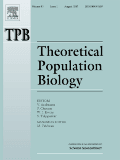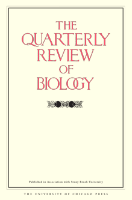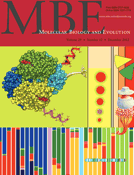
THEORETICAL POPULATION BIOLOGY
Scope & Guideline
Elevating Research in Theoretical Ecology
Introduction
Aims and Scopes
- Population Dynamics Modeling:
The journal emphasizes the development and application of mathematical models to understand the dynamics of populations, including growth, decline, and interactions within and between species. - Genetic Variation and Evolution:
A core area of focus is the study of genetic variation within populations and the evolutionary processes that influence this variation, including natural selection, mutation, and genetic drift. - Ecological Interactions:
Research often explores the interactions between species, such as competition, predation, and mutualism, and how these interactions shape population structures and dynamics. - Spatial and Temporal Dynamics:
The journal includes studies that analyze how spatial arrangements and temporal changes affect population behavior and genetic diversity, integrating concepts from ecology and genetics. - Cultural and Social Dynamics in Populations:
There is a growing interest in cultural evolution and the impact of social behaviors on population dynamics, exploring how cultural traits influence biological processes. - Statistical and Computational Methods:
The application of statistical and computational techniques to infer population parameters and analyze complex models is a significant theme, ensuring rigorous methodological approaches are used.
Trending and Emerging
- Integrative Approaches to Population Dynamics:
There is an increasing trend towards integrating ecological, genetic, and cultural factors into population models, reflecting a more holistic understanding of population dynamics. - Focus on Multi-Species Interactions:
Research is increasingly focusing on the dynamics between multiple species, including competition and cooperation, which is crucial for understanding ecological networks and community dynamics. - Stochastic and Adaptive Models:
The use of stochastic models that incorporate randomness and adaptability in populations is on the rise, allowing for a better representation of real-world scenarios. - Cultural Evolution and Social Dynamics:
Emerging themes include the role of cultural evolution and social behaviors in shaping population dynamics, highlighting the intersection of biology and sociology. - Applications of Machine Learning and Data Science:
There is a growing incorporation of machine learning techniques and data-driven approaches to enhance the analysis of complex population dynamics and genetic data.
Declining or Waning
- Traditional Models of Population Genetics:
Classic models such as the Wright-Fisher model are still relevant, but there seems to be a shift towards more complex models that incorporate additional factors such as spatial structure and ecological interactions. - Single-Species Focus:
Research that solely focuses on single-species population dynamics is becoming less prominent, as there is a growing trend towards multi-species interactions and ecological networks. - Static Population Models:
Static models that do not account for temporal changes or environmental variability are being replaced by dynamic models that incorporate fluctuations and adaptive responses. - Generalized Theoretical Approaches:
Broad, generalized theoretical frameworks are less favored compared to specific, tailored models that address particular ecological or evolutionary questions. - Deterministic Models:
There is a noticeable decline in the use of strictly deterministic models, as stochastic models that account for random variations and uncertainties are becoming more prevalent.
Similar Journals

QUARTERLY REVIEW OF BIOLOGY
Advancing the Frontiers of Biological KnowledgeQUARTERLY REVIEW OF BIOLOGY, published by University of Chicago Press, stands as a premier journal dedicated to the dissemination of high-quality research and review articles in the field of biological sciences. With an impressive impact factor and an esteemed ranking of Q1 in the Agricultural and Biological Sciences category, the journal is a vital resource for researchers, professionals, and students aiming to stay at the forefront of biological research and developments. Since its inception in 1945, the journal has evolved to cover a broad scope of topics, fostering interdisciplinary dialogue and providing critical insights that promote scientific advancement. Although currently not an open access journal, its reputation is underscored by a remarkable standing in the 95th percentile across Scopus rankings within its field. Located in Chicago, Illinois, this journal continues to be a cornerstone for scholarly communication in biology, making valuable contributions to both academia and practical applications in the biological sciences.

JOURNAL OF BIOLOGICAL SYSTEMS
Innovating research at the intersection of biology and mathematics.Journal of Biological Systems is a prestigious journal published by World Scientific Publishing Co. Pte Ltd that serves as a vital platform for interdisciplinary research in the domains of agricultural and biological sciences, applied mathematics, and ecology. With its inception in 1996 and converging insightful contributions up to the present, the journal showcases innovative research that influences both theoretical and practical aspects within these critical fields. Its commendable Q2 category rankings in 2023 highlight its commitment to high-quality scholarship, achieving rankings of #62 in Agricultural and Biological Sciences, #243 in Applied Mathematics, and #204 in Ecology on the respected Scopus index. While the journal maintains a traditional publishing model, its rigorous peer-review process ensures that it meets the highest academic standards. The Journal of Biological Systems is essential reading for researchers, professionals, and students keen to keep abreast of the latest developments and methodologies impacting ecological systems, mathematical applications, and biological innovations.

PLoS Genetics
Fostering global collaboration in the realm of genetics and molecular biology.PLoS Genetics, published by the PUBLIC LIBRARY SCIENCE, is a leading open-access journal dedicated to advancing the field of genetics, molecular biology, and related disciplines. With its ISSN of 1553-7404, this esteemed journal has been offering unrestricted access to its content since 2005, fostering a global community of researchers, professionals, and students. Situated in the United States, its contributions can be found at 1160 Battery Street, Ste 100, San Francisco, CA 94111. As of 2023, PLoS Genetics proudly holds a Q1 ranking in multiple categories including Cancer Research, Ecology, Evolution, Behavior and Systematics, Genetics, and Molecular Biology, underscoring its impact in these vital scientific areas. The journal's commitment to disseminating high-quality research is reflected in its impressive Scopus rankings, with notable positions in various fields of study, ensuring that it remains a crucial resource for cutting-edge research and innovation. By providing an open-access platform, PLoS Genetics not only enhances the visibility of genetic research but also encourages collaborations and the sharing of knowledge that can lead to significant breakthroughs in science.

MOLECULAR GENETICS AND GENOMICS
Exploring the Depths of Molecular BiologyMOLECULAR GENETICS AND GENOMICS is a distinguished journal published by SPRINGER HEIDELBERG that serves as a pivotal platform for the communication of cutting-edge research and developments in the fields of genetics, molecular biology, and medicine. With an ISSN of 1617-4615 and an E-ISSN of 1617-4623, this journal has established itself since its inception in 1994 as a significant resource for researchers aiming to explore the complexities of genetic interactions and their implications in various biological systems. The journal is indexed in Scopus, with respectable rankings in the Genetics, Molecular Biology, and Biochemistry categories, showcasing its position within the academic community. It is categorized in the 2023 rankings as Q3 in Genetics, Q2 in Medicine (miscellaneous), and Q3 in Molecular Biology, indicating its relevance and quality in the scientific discourse. The journal also promotes open access, ensuring that researchers and professionals can easily share and advance knowledge in the rapidly evolving disciplines of molecular genetics and genomics. As the journal continues to bridge the gap between experimental and theoretical research, it presents a vital space for innovation, fostering collaborations and scholarly exchange among its readership.

GENETICS SELECTION EVOLUTION
Pioneering Research in Genetic EvolutionGENETICS SELECTION EVOLUTION is a prominent open-access journal published by BMC since 1989, situated in the United Kingdom. With a focus on evolutionary genetics and the mechanisms of selection, this journal serves as a pivotal platform for researchers, professionals, and students in the fields of Animal Science, Ecology, and Genetics. Notably, it has achieved remarkable rankings, being categorized in Q1 for various disciplines, reflecting its high impact and contribution to scientific discourse. The journal boasts an impressive recognition in the Scopus rankings, sitting at the 94th percentile in Animal Science and Zoology, and 86th percentile in Ecology and Evolution, underscoring its influence in these domains. Offering open access since its inception, it ensures broad dissemination of knowledge, allowing critical research findings to reach a wider audience. As we converge into its upcoming issues, the journal continues to foster the exploration of innovative genetic research and selection processes, shaping the future of evolutionary studies.

POPULATION ECOLOGY
Unraveling the complexities of biodiversity and conservation.Population Ecology is a leading journal dedicated to the advancement of research in the field of ecology, evolution, and behavior, published by the esteemed Wiley in Japan. With an impact factor indicative of its academic significance and ranked Q2 in the 2023 Ecology category, this journal serves as a pivotal resource for researchers, professionals, and students alike, facilitating the dissemination of high-quality research and innovative discussions. Covering diverse aspects of ecological dynamics, population processes, and their evolutionary implications, Population Ecology fosters a deeper understanding of species interactions and environmental factors shaping ecosystems. Available in both print and online formats (E-ISSN 1438-390X), the journal is committed to open access to enhance public engagement and accessibility to crucial scientific findings, ultimately contributing to informed decision-making regarding biodiversity and conservation efforts. With a robust ranking of #235 out of 721 in Agricultural and Biological Sciences, it is poised to remain at the forefront of ecological research through 2024 and beyond.

ZHURNAL OBSHCHEI BIOLOGII
Pioneering Discoveries in Ecology and MedicineZHURNAL OBSHCHEI BIOLOGII, published by MEZHDUNARODNAYA KNIGA in the Russian Federation, is a venerable journal with a rich history originating in 1945. Renowned for its contributions to the fields of Ecology, Evolution, Behavior, and Systematics, as well as Medicine (miscellaneous), this journal provides a platform for researchers and professionals to disseminate significant findings within these domains. Although currently not classified as an open access publication, ZHURNAL OBSHCHEI BIOLOGII holds a Q4 quartile designation in its respective categories, reflecting its unique positioning within the global research landscape. While its coverage in Scopus is limited, the journal remains an important resource for academics interested in the evolution of biological sciences, especially within the context of Russian research traditions. By fostering scholarly communication and collaboration, ZHURNAL OBSHCHEI BIOLOGII continues to play a critical role in advancing knowledge in the biological sciences.

MOLECULAR BIOLOGY AND EVOLUTION
Exploring the Frontiers of Life's ComplexityMOLECULAR BIOLOGY AND EVOLUTION, published by Oxford University Press, stands as a premier journal in the fields of molecular biology, evolutionary biology, and genetics. With a proud history dating back to its inception in 1983, the journal spans a convergence period through 2024, providing an exceptional platform for disseminating high-quality research. The journal is recognized in the top Q1 quartile across multiple categories, including Ecology, Evolution, Behavior and Systematics, and Genetics, reflecting its significant impact and relevance in these disciplines. With impressive Scopus rankings—10th in Ecology and Evolution, 12th in Genetics, and 22nd in Molecular Biology—it serves as a vital resource for scholars aiming to stay informed on cutting-edge developments in evolutionary processes and molecular genetics. While it currently does not offer open access, its curated contents resonate well with an audience of researchers, professionals, and students deeply interested in accelerating their understanding of the complexities of life through an evolutionary lens.

ACTA BIOTHEORETICA
Unveiling the Intersections of Theory and PracticeACTA BIOTHEORETICA is a distinguished academic journal published by Springer, offering a vital platform for the dissemination of research within various interdisciplinary fields including Agricultural and Biological Sciences, Applied Mathematics, Biochemistry, Genetics and Molecular Biology, Environmental Science, and Philosophy. The journal, with its extensive history since its inception in 1935, holds a significant impact factor within its respective categories, ranking Q2 in Agricultural and Biological Sciences and Q1 in Philosophy as of 2023. Its archives, spanning from historical publications to contemporary studies, serve as a rich repository for scholars, professionals, and students dedicated to advancing knowledge in these areas. ACTA BIOTHEORETICA invites contributions that push the boundaries of theoretical exploration and practical application, with the aim of fostering an understanding that bridges science and philosophy. Although not open access, the journal maintains wide accessibility through its integrated digital platforms, enhancing the reach and impact of published work worldwide. Its central office located in Dordrecht, Netherlands further accentuates its international appeal and significance.

Molecular Ecology Resources
Advancing the Frontiers of Molecular EcologyMolecular Ecology Resources, published by WILEY, is a leading international journal that specializes in the intersection of molecular biology with ecology and evolution. With an impressive impact factor signified by its Q1 status in multiple categories, including Biotechnology, Ecology, Evolution, Behavior and Systematics, and Genetics for 2023, this journal stands as a reputable source of groundbreaking research within the fields of agricultural and biological sciences. Its Scopus rankings are particularly noteworthy, placing it in the top tier of its respective categories, demonstrating its significance in advancing our understanding of molecular ecology. The journal has been committed to fostering high-quality scientific discourse from 2008 to 2024 and offers open access options to enhance its visibility and accessibility. As a researcher, professional, or student in these dynamic fields, engaging with Molecular Ecology Resources means contributing to and staying informed about the latest innovations and methodologies that shape our understanding of the biological world.